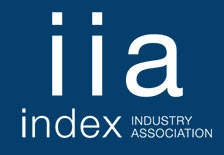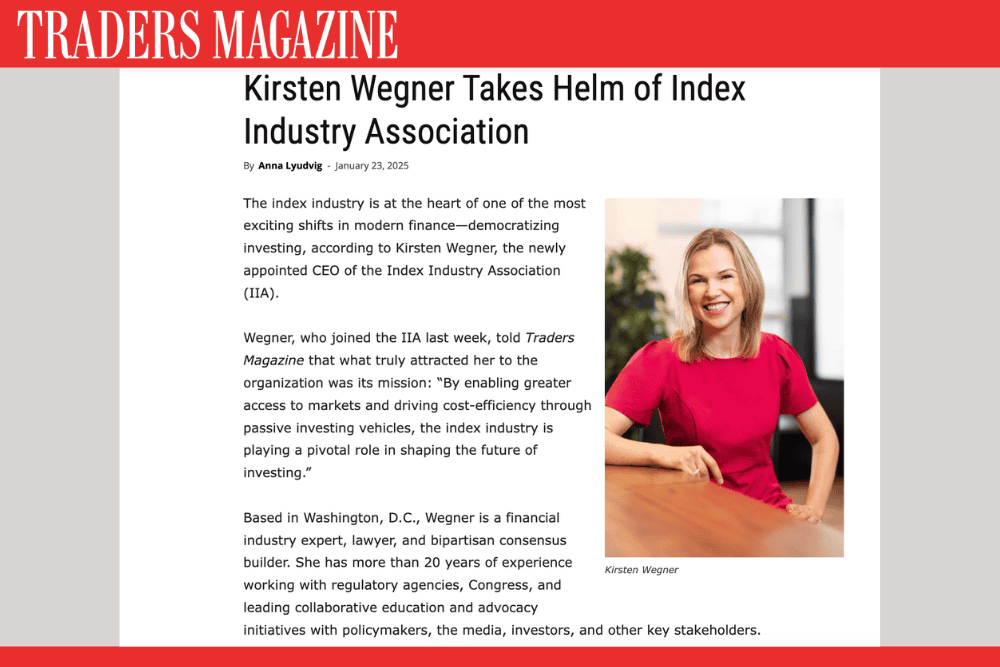- ESG focused asset managers are moving toward a broader view of Environmental factors, a widening lens on Social factors, and a new emphasis on Governance factors
- ESG asset class expansion continues, driven by significant growth in commodities
- Emerging technology such as Artificial Intelligence, Blockchain, Internet of Things, and Machine Learning are expected to help improve the timing, depth and predictive content of ESG data and metrics
NEW YORK (June 27, 2023) – The Index Industry Association (IIA) has just released its third annual ESG Global Survey of Asset Managers. In partnership with Opinium Research, the IIA has taken the pulse of 300 CIOs, CFOs and portfolio managers from the UK, US, Germany and France. Assets under management for firms surveyed ranged from less than $1 billion to more than $1 trillion US dollars. Survey questions addressed a broad range of topics concerning the future of ESG investing such as general investment outlook, market issues, data sufficiency and challenges, policy impact, and emerging technologies.
“Our survey seeks to help index providers better understand the needs of the asset management community and provide benchmarks and indexes that better meet their needs,” said IIA CEO Rick Redding. “Our survey results affirm that asset managers continue to prioritize ESG criteria in making investment decisions and demonstrate the managers’ desire for more, and more accurate, ESG data.”
ESG Will Reach Majority of Portfolios in Next Decade
The survey responses suggest that, despite significant economic volatility and political frictions, ESG’s future role in global investment portfolios continues to increase. Asset managers in France, Germany, the UK and US are ramping up their use of ESG factors. Eight in ten (81%) asset managers say ESG has become more (54%) or much more (28%) of a priority to their investment strategy over the past 12 months.
ESG investing remains on course to reach almost half of portfolios in 2-3 years’ time, and to reach 63% in 10 years. That’s on par with last year’s expectations (64%) but a notable rise from two years ago (52%). Interestingly, ESG support is highest among asset managers in the US, where 88% say it has become more of a priority.
Managers Revealed a Broadening View of ESG Factors
The “E” in ESG, or environmental criteria, continues to dominate, with asset managers expanding their view on applicable environmental factors. Seventy-five percent of those surveyed stated that environmental factors should be prioritized over social or governance factors. But climate change/carbon footprint is no longer the only environmental consideration. For the first time, natural resource usage or depletion (42%), sustainable supply chains (39%), and resilience of physical assets to climate change (38%) ranked above greenhouse gas and carbon emissions (32%) in terms of importance to ESG investment strategies.
At the same time, social issues – the “S” of ESG – are becoming more influential. More than three fifths (62%) of asset managers surveyed indicate that investments displaying positive social criteria are a core part of all or most portfolios. US asset managers again lead here, with 74% of those surveyed much more likely to incorporate social criteria in their portfolio decisions.
Corporate governance – the “G” of ESG – focuses on what firms do, how they do it, and with whom. Asset managers are paying special attention to fair business practices (41%), accounting transparency (39%), and diversity among boards and leadership (35%), among a host of other factors.
Expanding ESG Asset Classes Highlighted by Commodities
ESG continues to expand its influence beyond equities into fixed income and other asset classes. In the three years of the IIA survey, commodities have risen most significantly in the proportion of asset managers implementing ESG in this asset class, from 37% in 2021 to 62% in 2023. And 55% of global asset managers expect to see the use of ESG criteria in commodities increase a lot or by a moderate amount over the next 12 months.
Impact of Emerging Technology
The vast majority of asset managers view the available ESG tools and metrics as fairly or highly effective. Challenges remain. Among the biggest challenges cited by global asset managers are lack of data standardization across markets (30%), insufficient quantitative data (29%), and a lack of agreed ratings and methods by providers (24%).
The managers see emerging technologies—analytics, Internet of Things, blockchain, AI and machine learning, and others—as offering opportunities to improve the timing, depth and predictive content of ESG data and metrics. US asset managers are especially attuned to the potential ESG applications of AI and machine learning. Almost half (48%) expect it to have the biggest impact on ESG measurement and reporting over the next two years.
Notable findings from the 2023 ESG Global Survey of Asset Managers can be found in the Executive Summary and the full report can be downloaded here. Visit the IIA website for more information at www.indexindustry.org.
About the Index Industry Association (IIA)
The IIA is an independent, not-for-profit organization based in New York. Founded in March 2012 to provide a voice for the global index industry, the IIA works with market participants, regulators, and other representative bodies to promote competition and sound practices in the index industry, strengthen financial markets, and help those markets better serve the needs of investors. Our members have been calculating indices since 1896, and today administer more than three million. These indices cover a wide variety of asset classes, including equities, fixed income, commodities, and foreign exchange.
Many of the leading index providers in the world are members of the IIA, including Bloomberg Indices, Cboe Global Indexes, Chicago Booth Center for Research in Security Prices (CRSP), China Bond Pricing Co., China Securities Information Co., FTSE Russell, Hang Seng Indexes, Intercontinental Exchange (ICE) Data Services, Morningstar Indexes, MSCI Inc., Nasdaq Global Indexes, Parameta Solutions, Qontigo (DAX and STOXX indices), Shenzhen Securities Information Co., Ltd., S&P/Dow Jones Indices, and JPX Market Innovation & Research (Tokyo Stock Exchange).
For further information: Mandy Boyd, Buttonwood Communications: mboyd@buttonwoodpr.com
You might also be interested in
Index Industry Launches Continuing Education Program with CFP Board Approved Course
Washington, D.C. – July 9, 2025 – The Index Industry Association (IIA), serving as the global voice…
Market Uncertainty? Four Benefits of Indexes as a Tool for Investors
Traders Magazine
Kirsten Wegner Takes Helm of Index Industry Association
Traders Magazine



